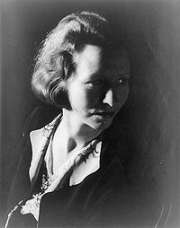|
Biografie Edna St. Vincent Millay
Edna St. Vincent Millay (February 22, 1892 – October 19, 1950) was an American lyrical poet and playwright and the first woman to receive the Pulitzer Prize for Poetry. She was also known for her unconventional, bohemian lifestyle and her many love affairs. She used the pseudonym Nancy Boyd for her prose work.
Millay was born in Rockland, Maine to Cora Lounella, a nurse, and Henry Tollman Millay, a schoolteacher who would later become superintendent of schools. Her middle name derives from St. Vincent's Hospital in New York, where her uncle's life had been saved just prior to her birth.
In 1904 Cora officially divorced Millay's father for financial irresponsibility, but they had been separated for some years prior. Struggling financially, Cora and her three daughters — Edna (who would later insist on being called "Vincent"), Norma, and Kathleen — moved from town to town, counting on the kindness of friends and relatives. Though poor, Cora never traveled without her trunk full of classic literature — including William Shakespeare, John Milton, and more — which she enthusiastically read to her children. Finally the family settled in Camden, Maine, moving into a small house on the property of Cora's well-heeled aunt. It was in this modest house in the middle of a field that Millay wrote the first of the poems that would catapult her to literary fame.
Cora taught her daughters to be independent and to speak their minds, which did not always sit well with the authority figures in Millay's life. Millay preferred to be called "Vincent" rather than Edna, which she found plain. (Her grade school principal, offended by her frank attitudes, refused to call her Vincent. Instead, he called her by any woman's name that started with a V.
At Camden High School Millay began nurturing her budding literary talents, starting at the school's literary magazine, The Megunticook, and eventually having some of her poetry published in the popular children's magazine St. Nicholas, the Camden Herald and, significantly, the anthology Current Literature, all by the age of 15.
Millay’s career and celebrity began in 1912 when she entered her poem “Renascence” into a poetry contest in The Lyric Year. The poem was so widely considered the best submission, that when it was ultimately placed fourth, it was quite the scandal for which Millay received much publicity. The first place winner, Orrick Johns, was among those who felt that “Renascence” was the best poem in the volume, and stated that “the award was as much an embarrassment to me as a triumph." One of the second prize winners even offered her his $250 prize money. In the immediate aftermath of The Lyric Year controversy, a wealthy woman named Caroline B. Dow heard Millay reciting her poetry and playing the piano at the Whitehall Inn in Camden, Maine, and was so impressed that she offered to pay for Millay’s education at Vassar College. After her graduation in 1917, she moved to New York City.
In New York she lived in Greenwich Village. It was at this time that she first attained great popularity in America. She won the Pulitzer Prize for Poetry in 1923, for The Harp-Weaver, and Other Poems. She was the first woman to be so honored for poetry. Her reputation was damaged by poetry she wrote in support of the Allied war effort during World War II. Merle Rubin noted: "She seems to have caught more flak from the literary critics for supporting democracy than Ezra Pound did for championing fascism."
In 1943 she was awarded the Frost Medal for her lifetime contribution to American poetry. She was the sixth recipient of that honor, and the second woman.
Her best-known poem might be "First Fig" from A Few Figs from Thistles (first published in 1920):
My candle burns at both ends;
It will not last the night;
But ah, my foes, and oh, my friends--
It gives a lovely light!
Millay wrote the poem, which she first called "My Candle," at Romany Marie's café in Greenwich Village.
Mathematicians recognize her sonnet "Euclid Alone Has Looked on Beauty Bare" (1922) as an expression of mathematical beauty, or an homage to the geometer Euclid.
However, many[who?] consider "Renascence" and "The Ballad of the Harp-Weaver" to be her finest poems.
Thomas Hardy once said that America had two great attractions: the skyscraper and the poetry of Edna St. Vincent Millay.
Also, she wrote five verse dramas early in her career, including Two Slatterns and a King, The Lamp and the Bell (written for Vassar College), and The King's Henchman (originally an opera). Her most famous verse drama is the often anthologized One Act play Aria da Capo, written for the Provincetown Players.
|




